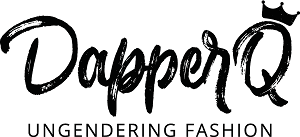As some of you may have noticed, dapperQ has been on hiatus. As a Black, queer femme, I have been trying to navigate the current state of the world while processing and healing the 44 years of racial trauma, gender inequities, and queer discrimination I have experienced throughout my lifetime. The violence I have recently witnessed against Black bodies; the erasure of queer and trans people from feminism and queer and Black liberation movements; and the structural inequalities that are manifest in every fiber of every institution in the U.S. and globally are not new to me. I have seen the horrors play over and over, not just on the internet, but in my own life. However, as a nurse who is now considered essential, working specifically on COVID-19 projects during a pandemic, these times feel different. I needed to take a break and assess the activist I do via dapperQ while prioritizing community needs and balancing self-care.
View this post on Instagram
I started to really consider: What is dapperQ’s role in Black and queer and trans liberation movements? Does continuing to write about queer fashion feel appropriate during these challenging times? When I am working in a hospital 40+ hours a week, is continuing to publish on the website and Instagram the best use of my free-time when I am hardly sleeping because I am fearful of being exposed and potentially dying from COVID-19, especially given my higher risk as a Black person?
And then Pride month came…
View this post on Instagram
On the 51st anniversary of the Stonewall Riots, a scene with eerie parallels to June 28, 1969 broke out just blocks away from the namesake bar. Police descended on hundreds of peaceful protestors from the Queer Liberation March for Black Lives on the edges of Washington Square Park. With mace and batons, the officers charged at marchers who were demanding the release of arrested protesters who had taken a stand against the killing of Black people at the hands of police.
The events of of that day and the recent months and years, really — the continuous killing of Black people by police, the forgotten murders of Black and brown trans women, the NYPD’s violence towards our community — underscore that we are still fighting the same dignity, autonomy, and safety and the right just to be that those queer and trans folks fought for when they set off the uprising at Stonewall one night fifty-one years ago.
On that fateful night of June that set off a week of riots, police raided the Stonewall Inn and arrested 13 people as part of a larger crackdown on gay bars operating without N.Y. State Liquor Authority licenses, according to Garance Franke-Ruta’s reporting in The Atlantic. At the time, Stonewall was a Mafia bar filled with “drags” and “queens” who weren’t accepted at other haunts, according to Dick Leitsch, who was the executive director of the Mattachine Society of New York.
In the lead up to the Stonewall Riots, LGBTQ+ people were arrested in Greenwich Village by laws that criminalized cross-dressing, according to historian Hugh Ryan. Through the 1940s, 50s, and 60s, police weaponized “masquerade laws,” old codes that prohibited “costumed dress,” to punish queer and trans people wearing articles of clothing that didn’t correspond with the gender they were assigned at birth, Ryan, the author of “When Brooklyn Was Queer,” wrote in History.
Among LGBTQ+ people, these laws were called the “three-article rule”: an individual had to be wearing three articles of clothing of the gender they were assigned at birth or else they’d be arrested. If you were assigned female at birth but caught wearing pants and a shirt, you could be arrested for failing to wear three articles of women’s clothing.
While this rule became part of the queer lexicon, a law citing a specific number of articles didn’t actually exist on the books. According to historians, calling it the “three-article rule” may have originated as a way for queer and trans people to warn each other about the police or served as an “informal rule of thumb,” Ryan wrote.
View this post on Instagram
Fashion is political, and for LGBTQ+ communities, our style is an act of self-love and self-affirmation, as well as an act of defiance and an important tool in our liberation. When dapperQ’s Youth Pride and New York Fashion Week shows were canceled, I spoke with many members of the community who hoped to see our work continue online. People shared with me how important it was to still have a virtual space where they can see others performing their queerness with joy and in defiance of society’s every effort to obliterate our being. I may not have the physical and mental energy to write, edit, and publish as often. But, I will do my part in every way I can.
That is dapperQ’s role. We are here to continue the Stonewall movement. Queer fashion, even in these times, is not frivolous or inconsequential. It was, and still remains, a form of in-your-face resistance.
If you are interested in joining our online resistance, please email [email protected].





